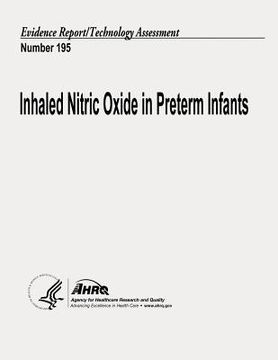Inhaled Nitric Oxide in Preterm Infants: Evidence Report/Technology Assessment Number 195 (en Inglés)
Reseña del libro "Inhaled Nitric Oxide in Preterm Infants: Evidence Report/Technology Assessment Number 195 (en Inglés)"
Neonatal lung disease is the most common complication of preterm delivery, and results in significant morbidity and mortality. Preterm infants suffer from both acute and chronic respiratory failure as a result of anatomic and biochemical disruption of lung function, lung inflammation and oxidative stress, nutritional deficiencies, and arrest of tracheobronchial and pulmonary vascular growth. Treatment for acute respiratory failure often contributes to evolving bronchopulmonary dysplasia (BPD) and chronic respiratory failure, due to barotrauma and oxygen toxicity from prolonged respiratory support, deficient nutrition, as well as immaturity of lung growth, vascular development and immunologic defenses. Pulmonary hypertension may occur in association with acute and/or chronic respiratory failure. Multiple etiologies make finding an effective treatment for respiratory failure in preterm infants challenging. Disorders related to prematurity and respiratory distress are among the leading causes of infant mortality in the U.S. Treatment options for respiratory failure in preterm infants include a variety of modalities. Prenatal steroids, antibiotics, exogenous surfactant replacement, tidal volume ventilation, conventional ventilation, continuous positive airway pressure, high flow oxygen administration, and high frequency ventilation are all used as therapeutic modalities. Treatment of preterm infants with inhaled nitric oxide (iNO) as a rescue therapy for refractory hypoxemic respiratory failure is an extension of the relative success of the treatment of term and near term infants with iNO. Inhaled NO has demonstrated efficacy in improving oxygenation and reducing the need for extracorporeal membrane oxygenation (ECMO) in late preterm infants born after 34 weeks gestation and full term infants with respiratory failure, with no evidence of long term benefits. Despite the approved use of iNO in full term and late preterm infants, the developmentally distinct mechanisms of respiratory failure and differing cardiovascular, pulmonary, and pharmacokinetic characteristics of more immature infants require systematic study of the short and long term outcomes for preterm infants treated with iNO to prevent or treat respiratory failure. The Cochrane review acknowledged very limited data on long term outcomes of preterm infants treated with iNO. If iNO is beneficial, the number need to treat would be very large. Papers published or presented from 2007 to present report conflicting results as to whether, in preterm infants, iNO has beneficial, adverse, or no effects on long term neurodevelopmental and pulmonary outcomes. Despite the ongoing controversy, iNO continues to be used for hypoxemic respiratory failure in preterm infants less than 34 weeks gestation even with potential harm to the developing lungs and brain. There is an urgent need to weigh the current evidence as to whether iNO is a safe and effective treatment in preterm infants. We sought to identify and synthesize evidence addressing the following questions: 1. Does inhaled nitric oxide (iNO) therapy increase survival and/or reduce the occurrence or severity of bronchopulmonary dysplasia (BPD) among premature infants who receive respiratory support? 2. Are there short term risks of iNO therapy among premature infants who receive respiratory support? 3. Are there effects of iNO therapy on long term pulmonary and/or neurodevelopmental outcomes among premature infants who receive respiratory support? 4. Does the effect of iNO therapy on BPD and/or death or neurodevelopmental impairment vary across subpopulations of premature infants? 5. Does the effect of iNO therapy on BPD and/or death or neurodevelopmental impairment vary by timing of initiation, mode of delivery, dose and duration, or concurrent therapies?

